Management and Operation Report: Marriott Hotel Leadership Analysis
VerifiedAdded on 2023/02/01
|14
|4854
|88
Report
AI Summary
This report delves into the critical roles of leaders and managers within the Marriott Hotel, exploring how they contribute to the organization's success. It defines and compares the distinct characteristics of leaders and managers, highlighting their functions and responsibilities. The report examines various leadership theories, including contingency, situational, and transformational leadership, and analyzes their strengths and weaknesses in different situations. It also explores the application of these theories in addressing challenges such as labor turnover and interpersonal conflicts. Furthermore, the report investigates key approaches to operational management, emphasizing the importance of leaders and managers in improving efficiencies and achieving business objectives. Finally, it considers the factors within the business environment that impact operational management and decision-making processes. The analysis includes discussions on practical examples and case studies, offering a comprehensive understanding of leadership and management in a real-world business context.
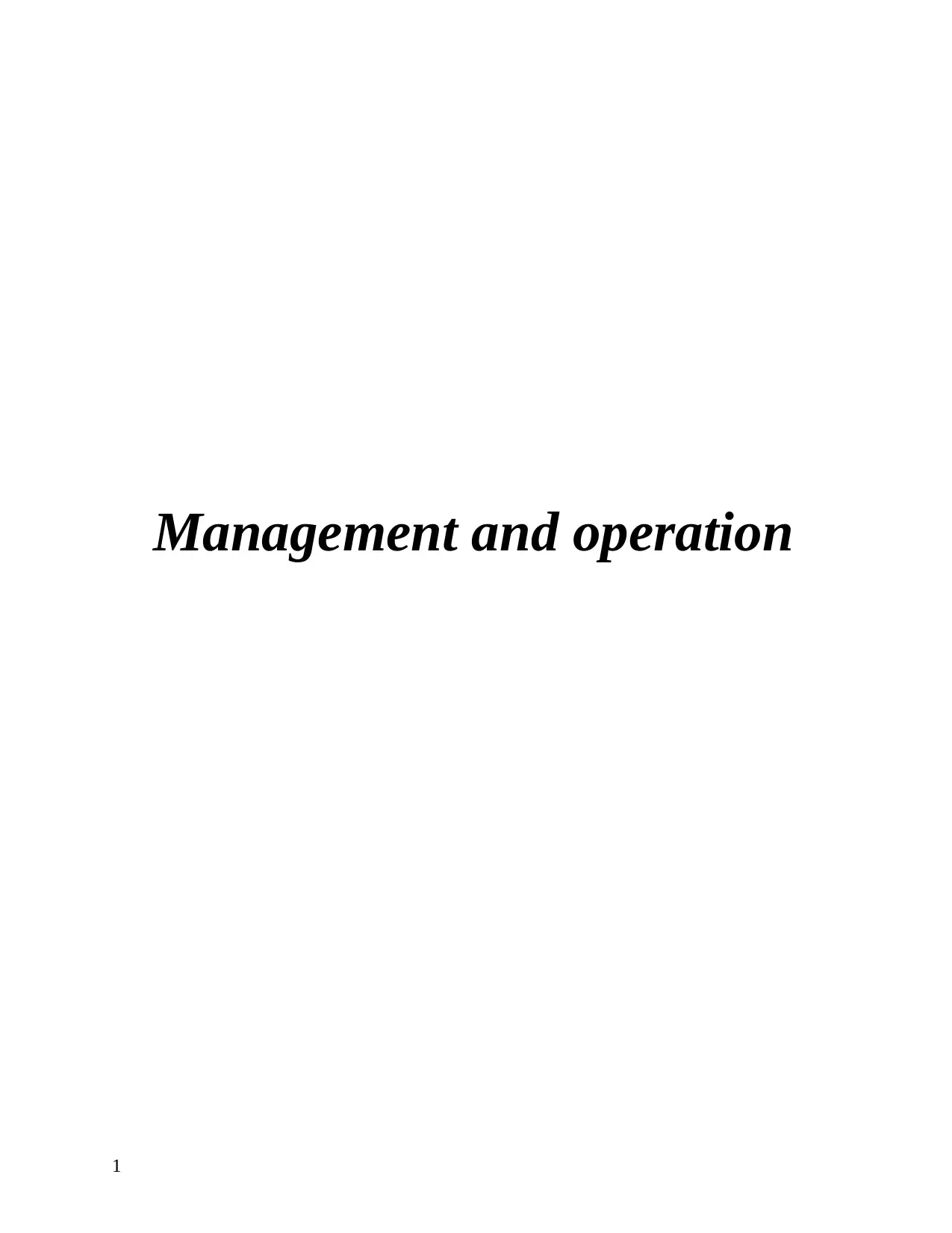
Management and operation
1
1
Paraphrase This Document
Need a fresh take? Get an instant paraphrase of this document with our AI Paraphraser
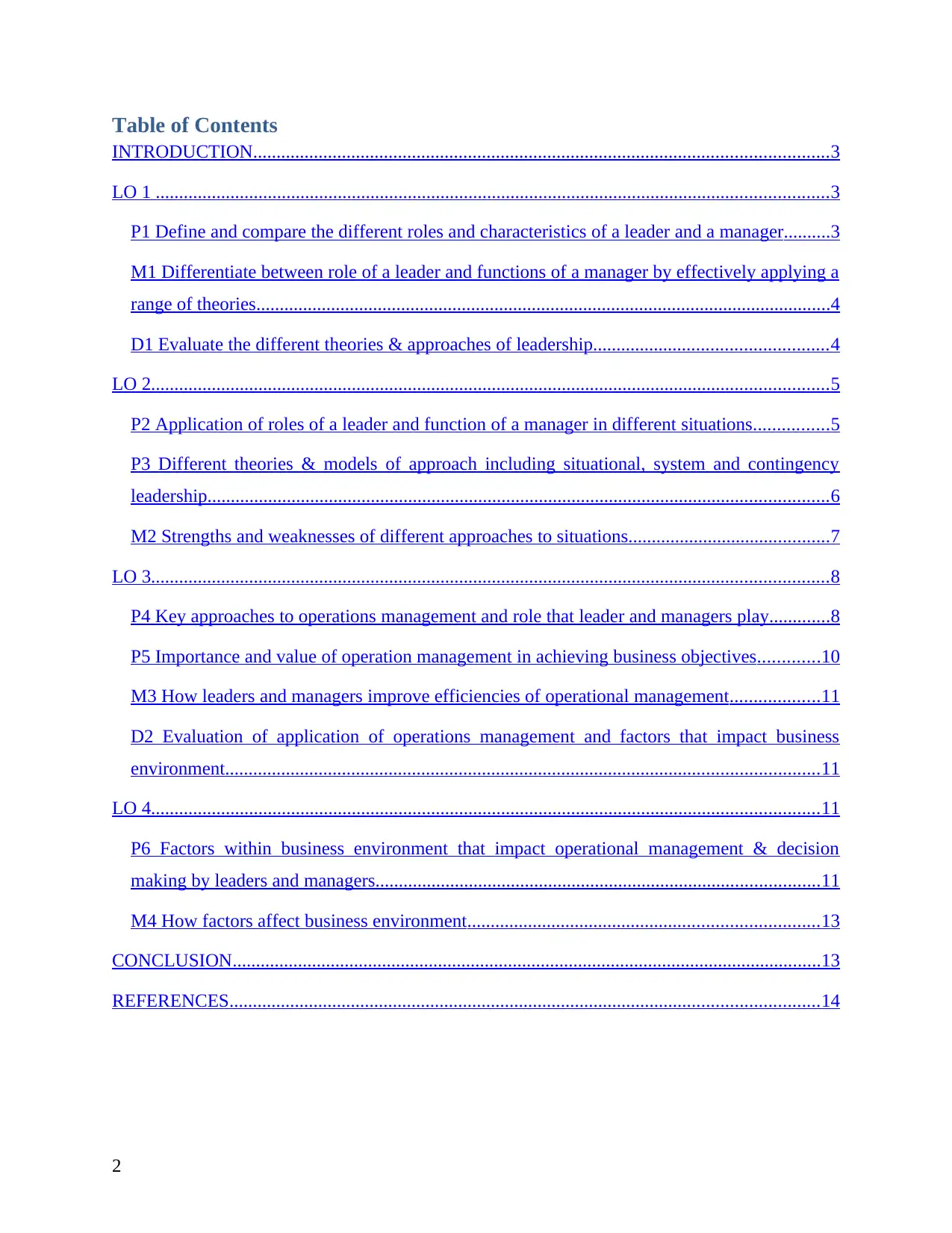
Table of Contents
INTRODUCTION...........................................................................................................................3
LO 1 ................................................................................................................................................3
P1 Define and compare the different roles and characteristics of a leader and a manager..........3
M1 Differentiate between role of a leader and functions of a manager by effectively applying a
range of theories...........................................................................................................................4
D1 Evaluate the different theories & approaches of leadership..................................................4
LO 2.................................................................................................................................................5
P2 Application of roles of a leader and function of a manager in different situations................5
P3 Different theories & models of approach including situational, system and contingency
leadership.....................................................................................................................................6
M2 Strengths and weaknesses of different approaches to situations...........................................7
LO 3.................................................................................................................................................8
P4 Key approaches to operations management and role that leader and managers play.............8
P5 Importance and value of operation management in achieving business objectives.............10
M3 How leaders and managers improve efficiencies of operational management...................11
D2 Evaluation of application of operations management and factors that impact business
environment...............................................................................................................................11
LO 4...............................................................................................................................................11
P6 Factors within business environment that impact operational management & decision
making by leaders and managers...............................................................................................11
M4 How factors affect business environment...........................................................................13
CONCLUSION..............................................................................................................................13
REFERENCES..............................................................................................................................14
2
INTRODUCTION...........................................................................................................................3
LO 1 ................................................................................................................................................3
P1 Define and compare the different roles and characteristics of a leader and a manager..........3
M1 Differentiate between role of a leader and functions of a manager by effectively applying a
range of theories...........................................................................................................................4
D1 Evaluate the different theories & approaches of leadership..................................................4
LO 2.................................................................................................................................................5
P2 Application of roles of a leader and function of a manager in different situations................5
P3 Different theories & models of approach including situational, system and contingency
leadership.....................................................................................................................................6
M2 Strengths and weaknesses of different approaches to situations...........................................7
LO 3.................................................................................................................................................8
P4 Key approaches to operations management and role that leader and managers play.............8
P5 Importance and value of operation management in achieving business objectives.............10
M3 How leaders and managers improve efficiencies of operational management...................11
D2 Evaluation of application of operations management and factors that impact business
environment...............................................................................................................................11
LO 4...............................................................................................................................................11
P6 Factors within business environment that impact operational management & decision
making by leaders and managers...............................................................................................11
M4 How factors affect business environment...........................................................................13
CONCLUSION..............................................................................................................................13
REFERENCES..............................................................................................................................14
2
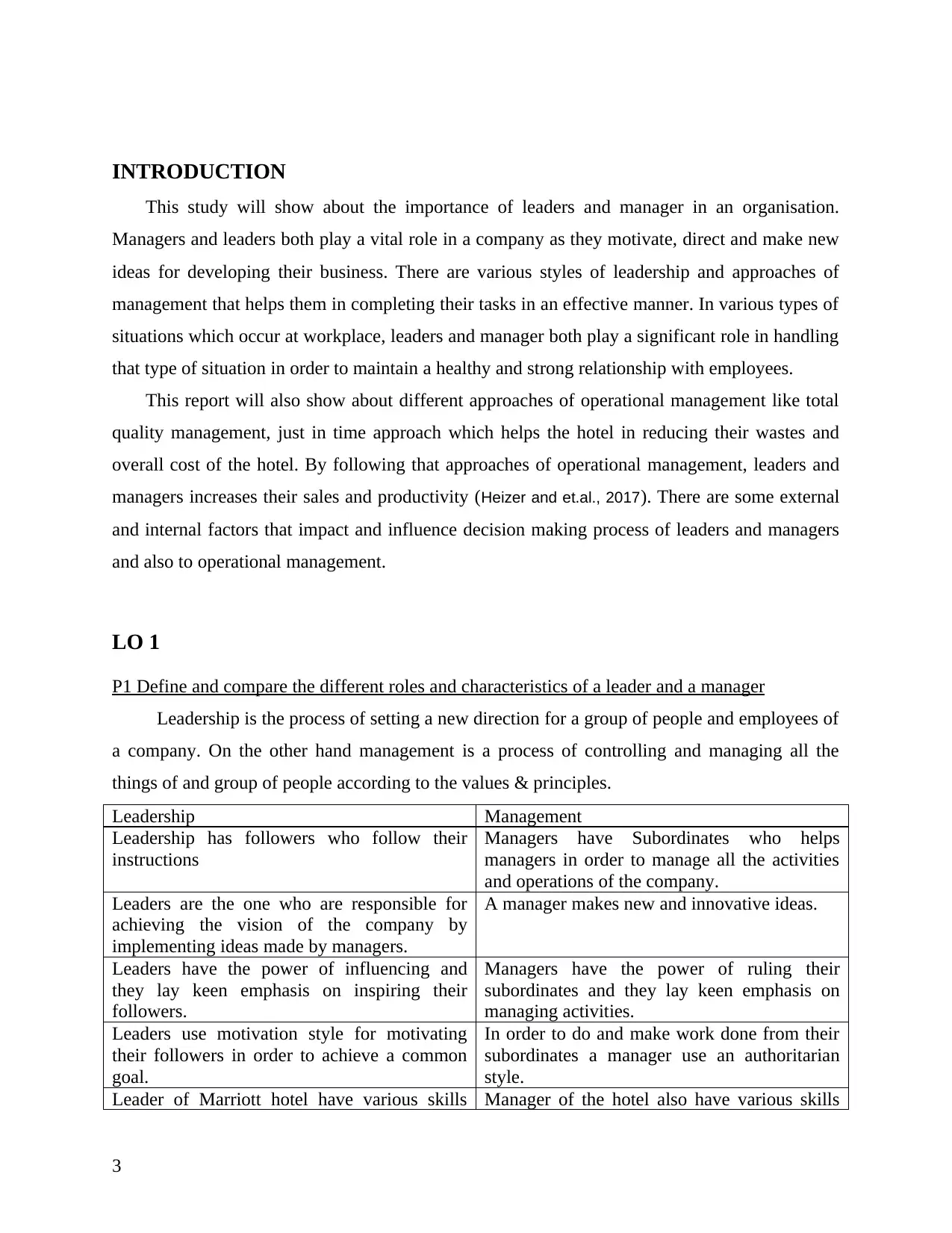
INTRODUCTION
This study will show about the importance of leaders and manager in an organisation.
Managers and leaders both play a vital role in a company as they motivate, direct and make new
ideas for developing their business. There are various styles of leadership and approaches of
management that helps them in completing their tasks in an effective manner. In various types of
situations which occur at workplace, leaders and manager both play a significant role in handling
that type of situation in order to maintain a healthy and strong relationship with employees.
This report will also show about different approaches of operational management like total
quality management, just in time approach which helps the hotel in reducing their wastes and
overall cost of the hotel. By following that approaches of operational management, leaders and
managers increases their sales and productivity (Heizer and et.al., 2017). There are some external
and internal factors that impact and influence decision making process of leaders and managers
and also to operational management.
LO 1
P1 Define and compare the different roles and characteristics of a leader and a manager
Leadership is the process of setting a new direction for a group of people and employees of
a company. On the other hand management is a process of controlling and managing all the
things of and group of people according to the values & principles.
Leadership Management
Leadership has followers who follow their
instructions
Managers have Subordinates who helps
managers in order to manage all the activities
and operations of the company.
Leaders are the one who are responsible for
achieving the vision of the company by
implementing ideas made by managers.
A manager makes new and innovative ideas.
Leaders have the power of influencing and
they lay keen emphasis on inspiring their
followers.
Managers have the power of ruling their
subordinates and they lay keen emphasis on
managing activities.
Leaders use motivation style for motivating
their followers in order to achieve a common
goal.
In order to do and make work done from their
subordinates a manager use an authoritarian
style.
Leader of Marriott hotel have various skills Manager of the hotel also have various skills
3
This study will show about the importance of leaders and manager in an organisation.
Managers and leaders both play a vital role in a company as they motivate, direct and make new
ideas for developing their business. There are various styles of leadership and approaches of
management that helps them in completing their tasks in an effective manner. In various types of
situations which occur at workplace, leaders and manager both play a significant role in handling
that type of situation in order to maintain a healthy and strong relationship with employees.
This report will also show about different approaches of operational management like total
quality management, just in time approach which helps the hotel in reducing their wastes and
overall cost of the hotel. By following that approaches of operational management, leaders and
managers increases their sales and productivity (Heizer and et.al., 2017). There are some external
and internal factors that impact and influence decision making process of leaders and managers
and also to operational management.
LO 1
P1 Define and compare the different roles and characteristics of a leader and a manager
Leadership is the process of setting a new direction for a group of people and employees of
a company. On the other hand management is a process of controlling and managing all the
things of and group of people according to the values & principles.
Leadership Management
Leadership has followers who follow their
instructions
Managers have Subordinates who helps
managers in order to manage all the activities
and operations of the company.
Leaders are the one who are responsible for
achieving the vision of the company by
implementing ideas made by managers.
A manager makes new and innovative ideas.
Leaders have the power of influencing and
they lay keen emphasis on inspiring their
followers.
Managers have the power of ruling their
subordinates and they lay keen emphasis on
managing activities.
Leaders use motivation style for motivating
their followers in order to achieve a common
goal.
In order to do and make work done from their
subordinates a manager use an authoritarian
style.
Leader of Marriott hotel have various skills Manager of the hotel also have various skills
3
⊘ This is a preview!⊘
Do you want full access?
Subscribe today to unlock all pages.

Trusted by 1+ million students worldwide
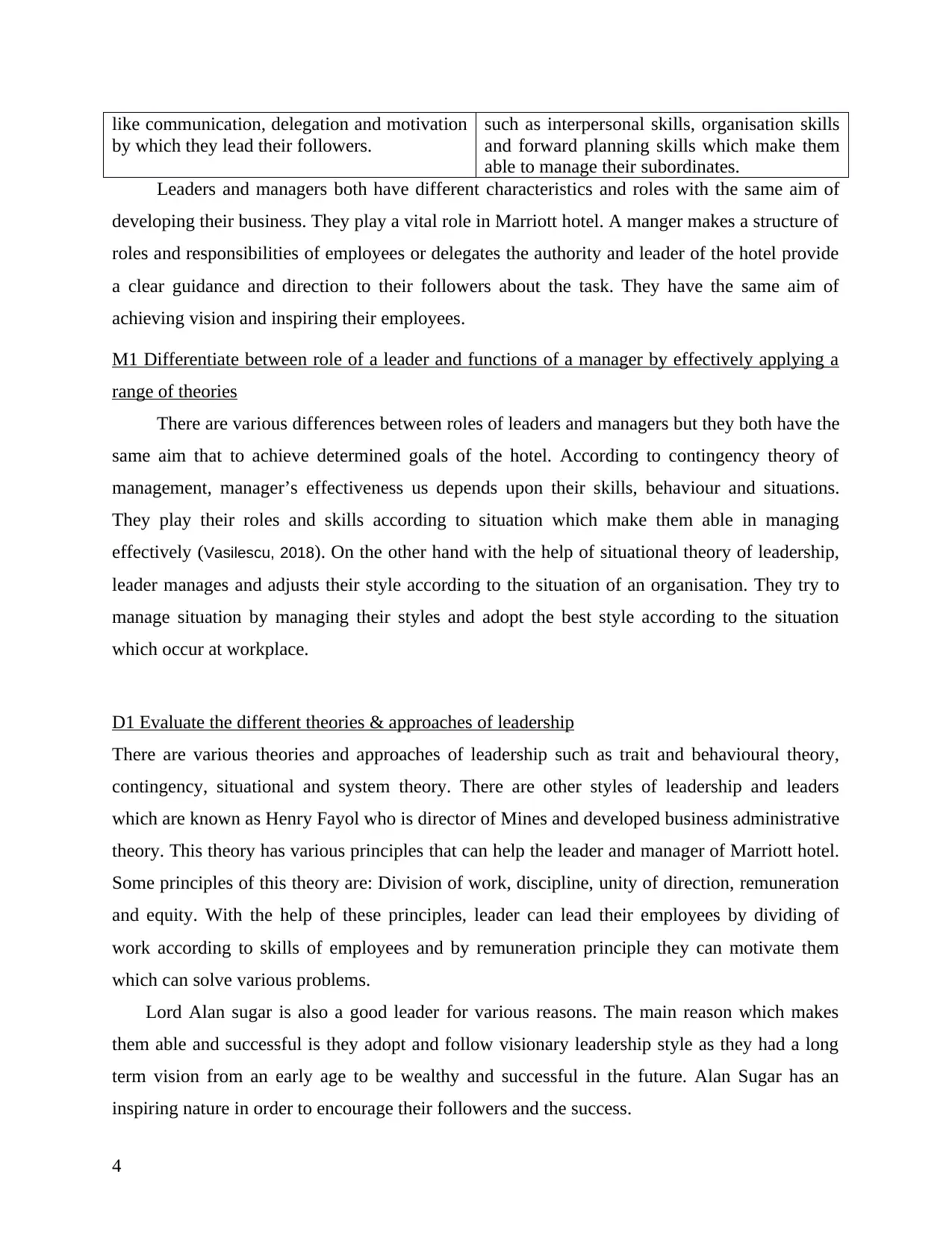
like communication, delegation and motivation
by which they lead their followers.
such as interpersonal skills, organisation skills
and forward planning skills which make them
able to manage their subordinates.
Leaders and managers both have different characteristics and roles with the same aim of
developing their business. They play a vital role in Marriott hotel. A manger makes a structure of
roles and responsibilities of employees or delegates the authority and leader of the hotel provide
a clear guidance and direction to their followers about the task. They have the same aim of
achieving vision and inspiring their employees.
M1 Differentiate between role of a leader and functions of a manager by effectively applying a
range of theories
There are various differences between roles of leaders and managers but they both have the
same aim that to achieve determined goals of the hotel. According to contingency theory of
management, manager’s effectiveness us depends upon their skills, behaviour and situations.
They play their roles and skills according to situation which make them able in managing
effectively (Vasilescu, 2018). On the other hand with the help of situational theory of leadership,
leader manages and adjusts their style according to the situation of an organisation. They try to
manage situation by managing their styles and adopt the best style according to the situation
which occur at workplace.
D1 Evaluate the different theories & approaches of leadership
There are various theories and approaches of leadership such as trait and behavioural theory,
contingency, situational and system theory. There are other styles of leadership and leaders
which are known as Henry Fayol who is director of Mines and developed business administrative
theory. This theory has various principles that can help the leader and manager of Marriott hotel.
Some principles of this theory are: Division of work, discipline, unity of direction, remuneration
and equity. With the help of these principles, leader can lead their employees by dividing of
work according to skills of employees and by remuneration principle they can motivate them
which can solve various problems.
Lord Alan sugar is also a good leader for various reasons. The main reason which makes
them able and successful is they adopt and follow visionary leadership style as they had a long
term vision from an early age to be wealthy and successful in the future. Alan Sugar has an
inspiring nature in order to encourage their followers and the success.
4
by which they lead their followers.
such as interpersonal skills, organisation skills
and forward planning skills which make them
able to manage their subordinates.
Leaders and managers both have different characteristics and roles with the same aim of
developing their business. They play a vital role in Marriott hotel. A manger makes a structure of
roles and responsibilities of employees or delegates the authority and leader of the hotel provide
a clear guidance and direction to their followers about the task. They have the same aim of
achieving vision and inspiring their employees.
M1 Differentiate between role of a leader and functions of a manager by effectively applying a
range of theories
There are various differences between roles of leaders and managers but they both have the
same aim that to achieve determined goals of the hotel. According to contingency theory of
management, manager’s effectiveness us depends upon their skills, behaviour and situations.
They play their roles and skills according to situation which make them able in managing
effectively (Vasilescu, 2018). On the other hand with the help of situational theory of leadership,
leader manages and adjusts their style according to the situation of an organisation. They try to
manage situation by managing their styles and adopt the best style according to the situation
which occur at workplace.
D1 Evaluate the different theories & approaches of leadership
There are various theories and approaches of leadership such as trait and behavioural theory,
contingency, situational and system theory. There are other styles of leadership and leaders
which are known as Henry Fayol who is director of Mines and developed business administrative
theory. This theory has various principles that can help the leader and manager of Marriott hotel.
Some principles of this theory are: Division of work, discipline, unity of direction, remuneration
and equity. With the help of these principles, leader can lead their employees by dividing of
work according to skills of employees and by remuneration principle they can motivate them
which can solve various problems.
Lord Alan sugar is also a good leader for various reasons. The main reason which makes
them able and successful is they adopt and follow visionary leadership style as they had a long
term vision from an early age to be wealthy and successful in the future. Alan Sugar has an
inspiring nature in order to encourage their followers and the success.
4
Paraphrase This Document
Need a fresh take? Get an instant paraphrase of this document with our AI Paraphraser
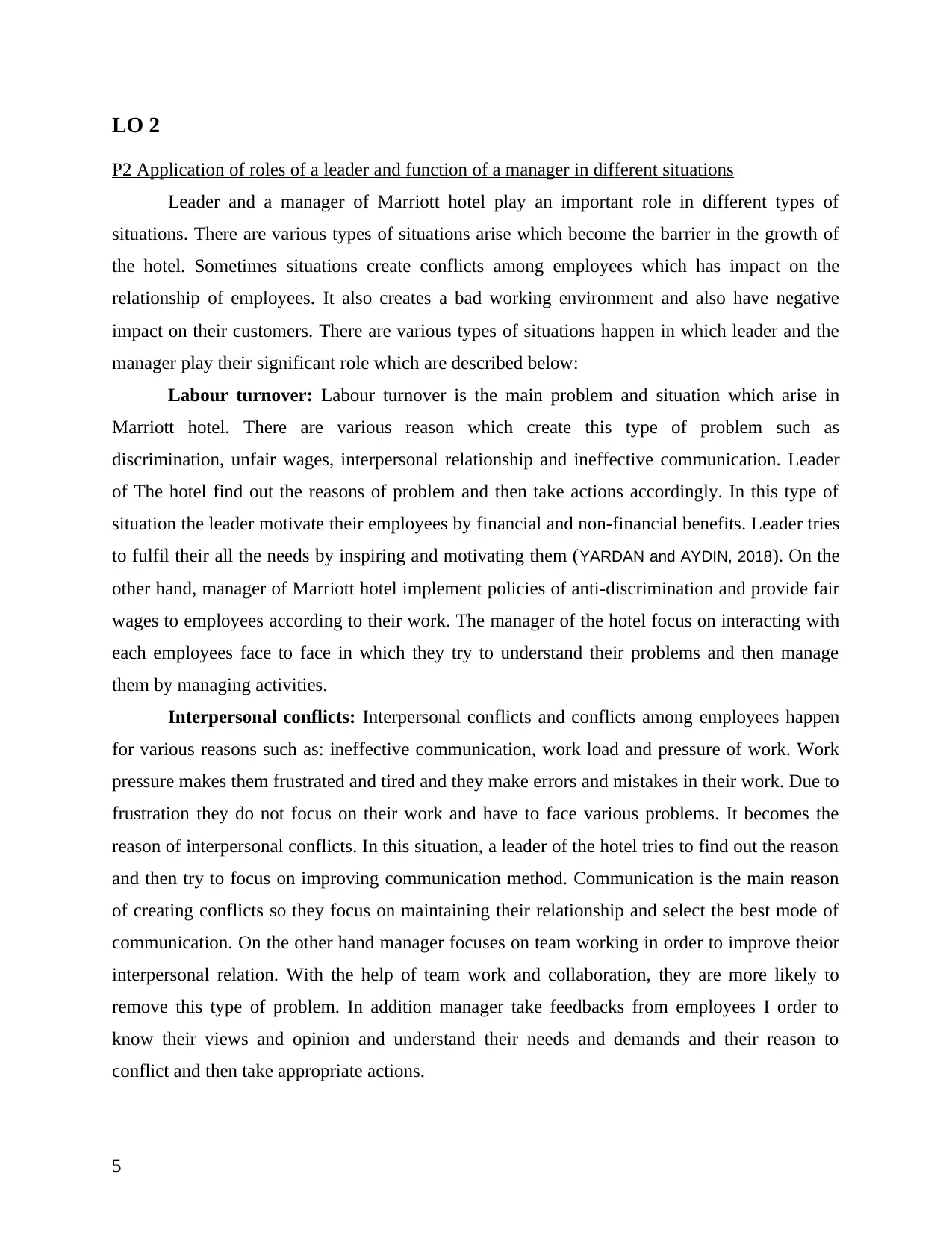
LO 2
P2 Application of roles of a leader and function of a manager in different situations
Leader and a manager of Marriott hotel play an important role in different types of
situations. There are various types of situations arise which become the barrier in the growth of
the hotel. Sometimes situations create conflicts among employees which has impact on the
relationship of employees. It also creates a bad working environment and also have negative
impact on their customers. There are various types of situations happen in which leader and the
manager play their significant role which are described below:
Labour turnover: Labour turnover is the main problem and situation which arise in
Marriott hotel. There are various reason which create this type of problem such as
discrimination, unfair wages, interpersonal relationship and ineffective communication. Leader
of The hotel find out the reasons of problem and then take actions accordingly. In this type of
situation the leader motivate their employees by financial and non-financial benefits. Leader tries
to fulfil their all the needs by inspiring and motivating them (YARDAN and AYDIN, 2018). On the
other hand, manager of Marriott hotel implement policies of anti-discrimination and provide fair
wages to employees according to their work. The manager of the hotel focus on interacting with
each employees face to face in which they try to understand their problems and then manage
them by managing activities.
Interpersonal conflicts: Interpersonal conflicts and conflicts among employees happen
for various reasons such as: ineffective communication, work load and pressure of work. Work
pressure makes them frustrated and tired and they make errors and mistakes in their work. Due to
frustration they do not focus on their work and have to face various problems. It becomes the
reason of interpersonal conflicts. In this situation, a leader of the hotel tries to find out the reason
and then try to focus on improving communication method. Communication is the main reason
of creating conflicts so they focus on maintaining their relationship and select the best mode of
communication. On the other hand manager focuses on team working in order to improve theior
interpersonal relation. With the help of team work and collaboration, they are more likely to
remove this type of problem. In addition manager take feedbacks from employees I order to
know their views and opinion and understand their needs and demands and their reason to
conflict and then take appropriate actions.
5
P2 Application of roles of a leader and function of a manager in different situations
Leader and a manager of Marriott hotel play an important role in different types of
situations. There are various types of situations arise which become the barrier in the growth of
the hotel. Sometimes situations create conflicts among employees which has impact on the
relationship of employees. It also creates a bad working environment and also have negative
impact on their customers. There are various types of situations happen in which leader and the
manager play their significant role which are described below:
Labour turnover: Labour turnover is the main problem and situation which arise in
Marriott hotel. There are various reason which create this type of problem such as
discrimination, unfair wages, interpersonal relationship and ineffective communication. Leader
of The hotel find out the reasons of problem and then take actions accordingly. In this type of
situation the leader motivate their employees by financial and non-financial benefits. Leader tries
to fulfil their all the needs by inspiring and motivating them (YARDAN and AYDIN, 2018). On the
other hand, manager of Marriott hotel implement policies of anti-discrimination and provide fair
wages to employees according to their work. The manager of the hotel focus on interacting with
each employees face to face in which they try to understand their problems and then manage
them by managing activities.
Interpersonal conflicts: Interpersonal conflicts and conflicts among employees happen
for various reasons such as: ineffective communication, work load and pressure of work. Work
pressure makes them frustrated and tired and they make errors and mistakes in their work. Due to
frustration they do not focus on their work and have to face various problems. It becomes the
reason of interpersonal conflicts. In this situation, a leader of the hotel tries to find out the reason
and then try to focus on improving communication method. Communication is the main reason
of creating conflicts so they focus on maintaining their relationship and select the best mode of
communication. On the other hand manager focuses on team working in order to improve theior
interpersonal relation. With the help of team work and collaboration, they are more likely to
remove this type of problem. In addition manager take feedbacks from employees I order to
know their views and opinion and understand their needs and demands and their reason to
conflict and then take appropriate actions.
5
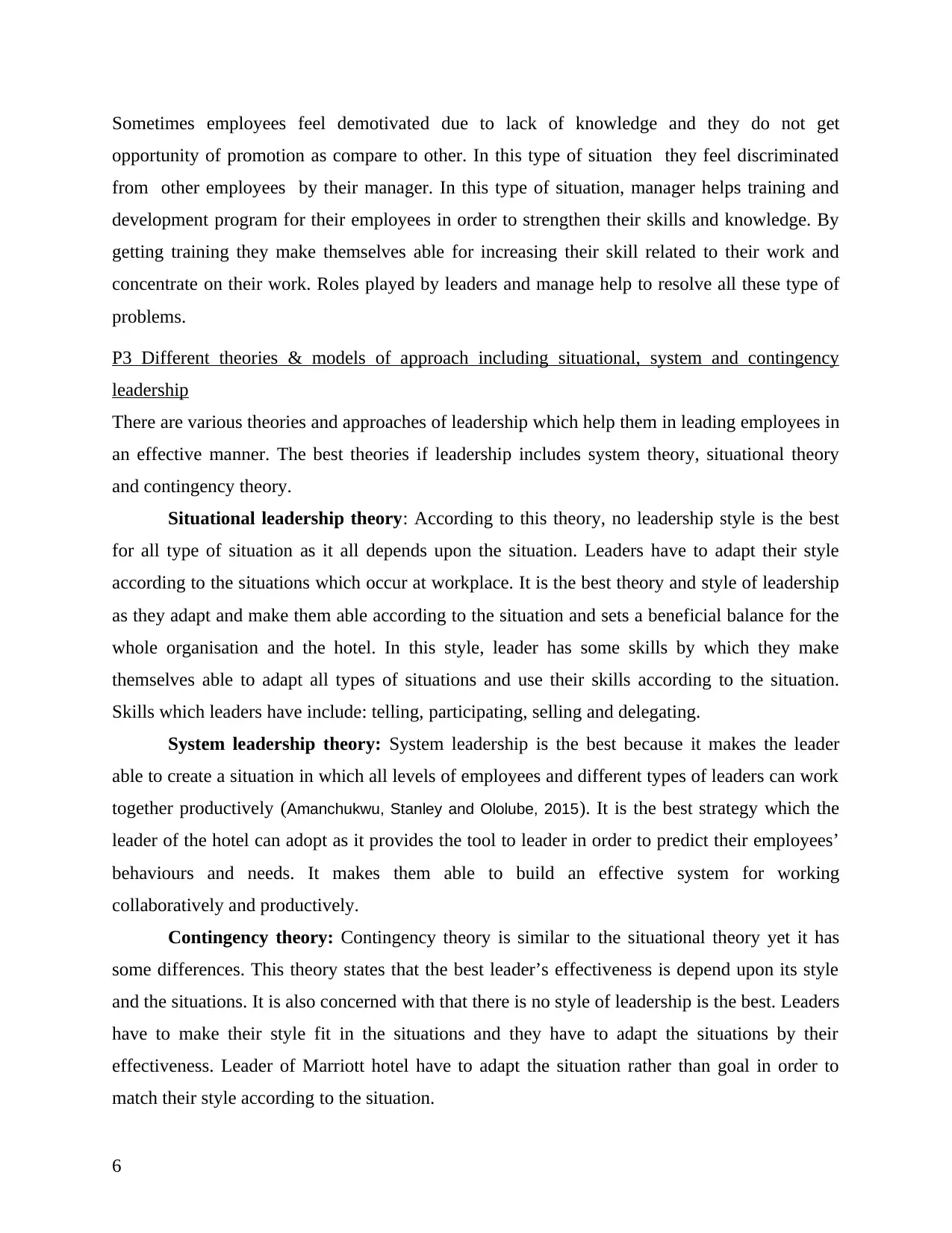
Sometimes employees feel demotivated due to lack of knowledge and they do not get
opportunity of promotion as compare to other. In this type of situation they feel discriminated
from other employees by their manager. In this type of situation, manager helps training and
development program for their employees in order to strengthen their skills and knowledge. By
getting training they make themselves able for increasing their skill related to their work and
concentrate on their work. Roles played by leaders and manage help to resolve all these type of
problems.
P3 Different theories & models of approach including situational, system and contingency
leadership
There are various theories and approaches of leadership which help them in leading employees in
an effective manner. The best theories if leadership includes system theory, situational theory
and contingency theory.
Situational leadership theory: According to this theory, no leadership style is the best
for all type of situation as it all depends upon the situation. Leaders have to adapt their style
according to the situations which occur at workplace. It is the best theory and style of leadership
as they adapt and make them able according to the situation and sets a beneficial balance for the
whole organisation and the hotel. In this style, leader has some skills by which they make
themselves able to adapt all types of situations and use their skills according to the situation.
Skills which leaders have include: telling, participating, selling and delegating.
System leadership theory: System leadership is the best because it makes the leader
able to create a situation in which all levels of employees and different types of leaders can work
together productively (Amanchukwu, Stanley and Ololube, 2015). It is the best strategy which the
leader of the hotel can adopt as it provides the tool to leader in order to predict their employees’
behaviours and needs. It makes them able to build an effective system for working
collaboratively and productively.
Contingency theory: Contingency theory is similar to the situational theory yet it has
some differences. This theory states that the best leader’s effectiveness is depend upon its style
and the situations. It is also concerned with that there is no style of leadership is the best. Leaders
have to make their style fit in the situations and they have to adapt the situations by their
effectiveness. Leader of Marriott hotel have to adapt the situation rather than goal in order to
match their style according to the situation.
6
opportunity of promotion as compare to other. In this type of situation they feel discriminated
from other employees by their manager. In this type of situation, manager helps training and
development program for their employees in order to strengthen their skills and knowledge. By
getting training they make themselves able for increasing their skill related to their work and
concentrate on their work. Roles played by leaders and manage help to resolve all these type of
problems.
P3 Different theories & models of approach including situational, system and contingency
leadership
There are various theories and approaches of leadership which help them in leading employees in
an effective manner. The best theories if leadership includes system theory, situational theory
and contingency theory.
Situational leadership theory: According to this theory, no leadership style is the best
for all type of situation as it all depends upon the situation. Leaders have to adapt their style
according to the situations which occur at workplace. It is the best theory and style of leadership
as they adapt and make them able according to the situation and sets a beneficial balance for the
whole organisation and the hotel. In this style, leader has some skills by which they make
themselves able to adapt all types of situations and use their skills according to the situation.
Skills which leaders have include: telling, participating, selling and delegating.
System leadership theory: System leadership is the best because it makes the leader
able to create a situation in which all levels of employees and different types of leaders can work
together productively (Amanchukwu, Stanley and Ololube, 2015). It is the best strategy which the
leader of the hotel can adopt as it provides the tool to leader in order to predict their employees’
behaviours and needs. It makes them able to build an effective system for working
collaboratively and productively.
Contingency theory: Contingency theory is similar to the situational theory yet it has
some differences. This theory states that the best leader’s effectiveness is depend upon its style
and the situations. It is also concerned with that there is no style of leadership is the best. Leaders
have to make their style fit in the situations and they have to adapt the situations by their
effectiveness. Leader of Marriott hotel have to adapt the situation rather than goal in order to
match their style according to the situation.
6
⊘ This is a preview!⊘
Do you want full access?
Subscribe today to unlock all pages.

Trusted by 1+ million students worldwide
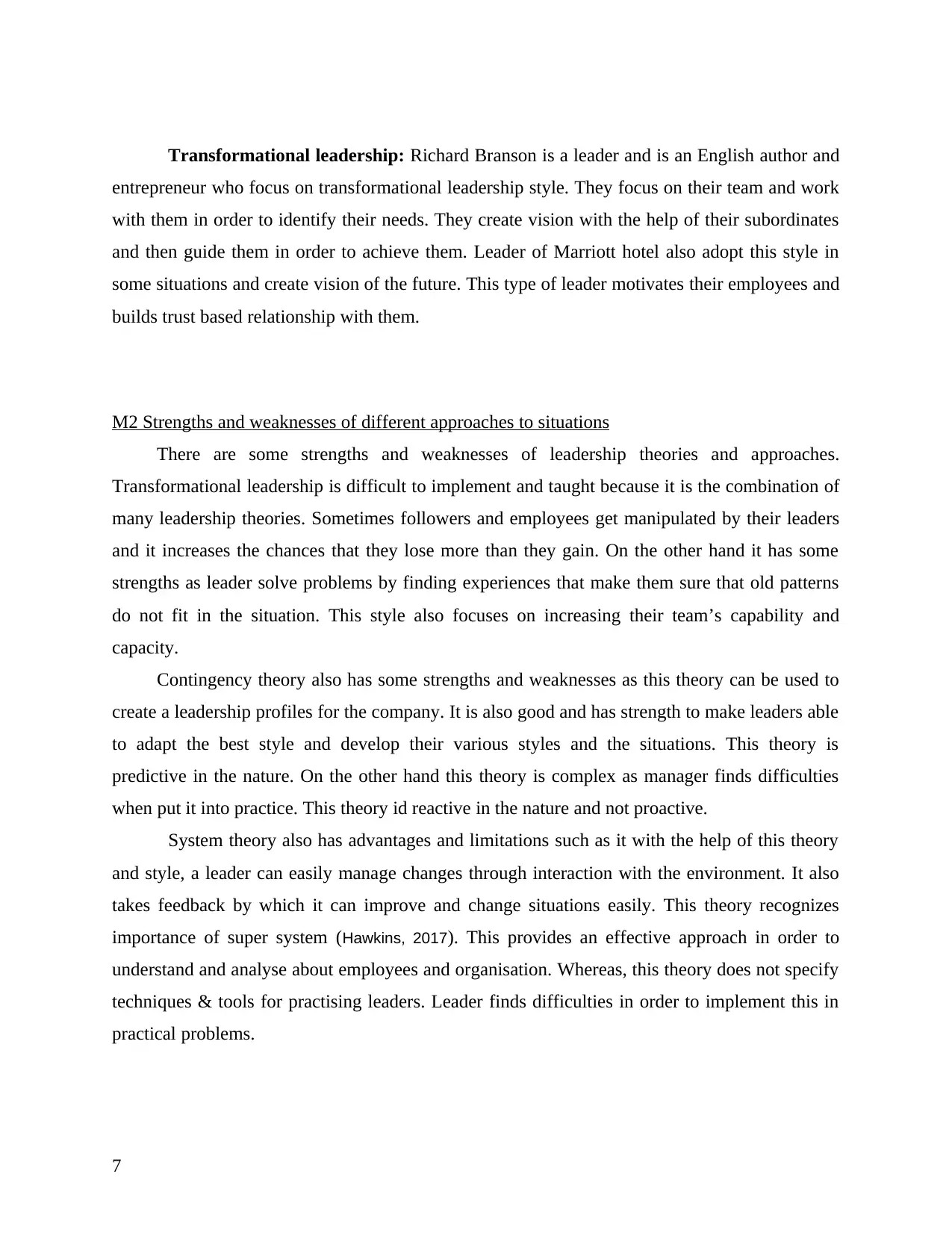
Transformational leadership: Richard Branson is a leader and is an English author and
entrepreneur who focus on transformational leadership style. They focus on their team and work
with them in order to identify their needs. They create vision with the help of their subordinates
and then guide them in order to achieve them. Leader of Marriott hotel also adopt this style in
some situations and create vision of the future. This type of leader motivates their employees and
builds trust based relationship with them.
M2 Strengths and weaknesses of different approaches to situations
There are some strengths and weaknesses of leadership theories and approaches.
Transformational leadership is difficult to implement and taught because it is the combination of
many leadership theories. Sometimes followers and employees get manipulated by their leaders
and it increases the chances that they lose more than they gain. On the other hand it has some
strengths as leader solve problems by finding experiences that make them sure that old patterns
do not fit in the situation. This style also focuses on increasing their team’s capability and
capacity.
Contingency theory also has some strengths and weaknesses as this theory can be used to
create a leadership profiles for the company. It is also good and has strength to make leaders able
to adapt the best style and develop their various styles and the situations. This theory is
predictive in the nature. On the other hand this theory is complex as manager finds difficulties
when put it into practice. This theory id reactive in the nature and not proactive.
System theory also has advantages and limitations such as it with the help of this theory
and style, a leader can easily manage changes through interaction with the environment. It also
takes feedback by which it can improve and change situations easily. This theory recognizes
importance of super system (Hawkins, 2017). This provides an effective approach in order to
understand and analyse about employees and organisation. Whereas, this theory does not specify
techniques & tools for practising leaders. Leader finds difficulties in order to implement this in
practical problems.
7
entrepreneur who focus on transformational leadership style. They focus on their team and work
with them in order to identify their needs. They create vision with the help of their subordinates
and then guide them in order to achieve them. Leader of Marriott hotel also adopt this style in
some situations and create vision of the future. This type of leader motivates their employees and
builds trust based relationship with them.
M2 Strengths and weaknesses of different approaches to situations
There are some strengths and weaknesses of leadership theories and approaches.
Transformational leadership is difficult to implement and taught because it is the combination of
many leadership theories. Sometimes followers and employees get manipulated by their leaders
and it increases the chances that they lose more than they gain. On the other hand it has some
strengths as leader solve problems by finding experiences that make them sure that old patterns
do not fit in the situation. This style also focuses on increasing their team’s capability and
capacity.
Contingency theory also has some strengths and weaknesses as this theory can be used to
create a leadership profiles for the company. It is also good and has strength to make leaders able
to adapt the best style and develop their various styles and the situations. This theory is
predictive in the nature. On the other hand this theory is complex as manager finds difficulties
when put it into practice. This theory id reactive in the nature and not proactive.
System theory also has advantages and limitations such as it with the help of this theory
and style, a leader can easily manage changes through interaction with the environment. It also
takes feedback by which it can improve and change situations easily. This theory recognizes
importance of super system (Hawkins, 2017). This provides an effective approach in order to
understand and analyse about employees and organisation. Whereas, this theory does not specify
techniques & tools for practising leaders. Leader finds difficulties in order to implement this in
practical problems.
7
Paraphrase This Document
Need a fresh take? Get an instant paraphrase of this document with our AI Paraphraser
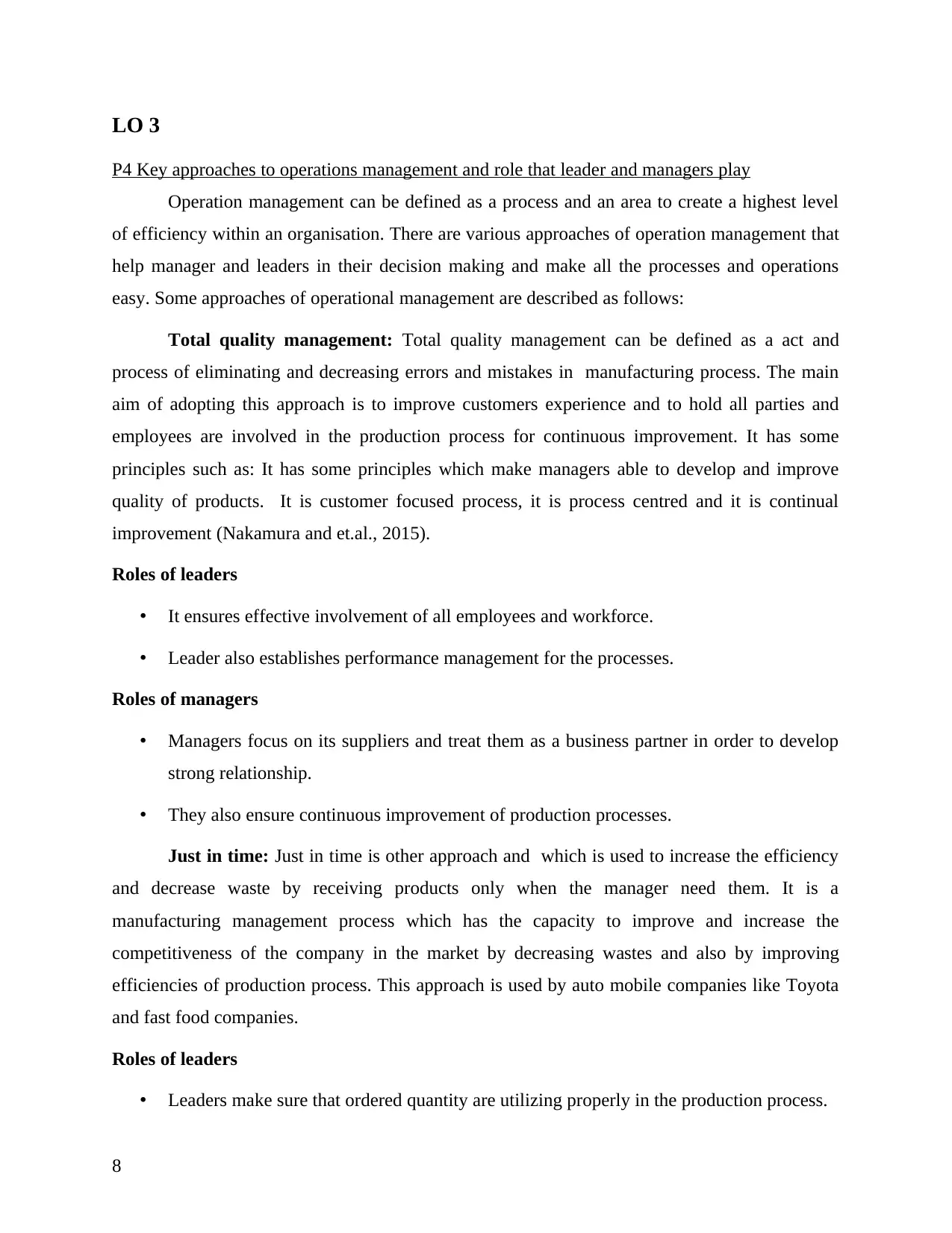
LO 3
P4 Key approaches to operations management and role that leader and managers play
Operation management can be defined as a process and an area to create a highest level
of efficiency within an organisation. There are various approaches of operation management that
help manager and leaders in their decision making and make all the processes and operations
easy. Some approaches of operational management are described as follows:
Total quality management: Total quality management can be defined as a act and
process of eliminating and decreasing errors and mistakes in manufacturing process. The main
aim of adopting this approach is to improve customers experience and to hold all parties and
employees are involved in the production process for continuous improvement. It has some
principles such as: It has some principles which make managers able to develop and improve
quality of products. It is customer focused process, it is process centred and it is continual
improvement (Nakamura and et.al., 2015).
Roles of leaders
• It ensures effective involvement of all employees and workforce.
• Leader also establishes performance management for the processes.
Roles of managers
• Managers focus on its suppliers and treat them as a business partner in order to develop
strong relationship.
• They also ensure continuous improvement of production processes.
Just in time: Just in time is other approach and which is used to increase the efficiency
and decrease waste by receiving products only when the manager need them. It is a
manufacturing management process which has the capacity to improve and increase the
competitiveness of the company in the market by decreasing wastes and also by improving
efficiencies of production process. This approach is used by auto mobile companies like Toyota
and fast food companies.
Roles of leaders
• Leaders make sure that ordered quantity are utilizing properly in the production process.
8
P4 Key approaches to operations management and role that leader and managers play
Operation management can be defined as a process and an area to create a highest level
of efficiency within an organisation. There are various approaches of operation management that
help manager and leaders in their decision making and make all the processes and operations
easy. Some approaches of operational management are described as follows:
Total quality management: Total quality management can be defined as a act and
process of eliminating and decreasing errors and mistakes in manufacturing process. The main
aim of adopting this approach is to improve customers experience and to hold all parties and
employees are involved in the production process for continuous improvement. It has some
principles such as: It has some principles which make managers able to develop and improve
quality of products. It is customer focused process, it is process centred and it is continual
improvement (Nakamura and et.al., 2015).
Roles of leaders
• It ensures effective involvement of all employees and workforce.
• Leader also establishes performance management for the processes.
Roles of managers
• Managers focus on its suppliers and treat them as a business partner in order to develop
strong relationship.
• They also ensure continuous improvement of production processes.
Just in time: Just in time is other approach and which is used to increase the efficiency
and decrease waste by receiving products only when the manager need them. It is a
manufacturing management process which has the capacity to improve and increase the
competitiveness of the company in the market by decreasing wastes and also by improving
efficiencies of production process. This approach is used by auto mobile companies like Toyota
and fast food companies.
Roles of leaders
• Leaders make sure that ordered quantity are utilizing properly in the production process.
8
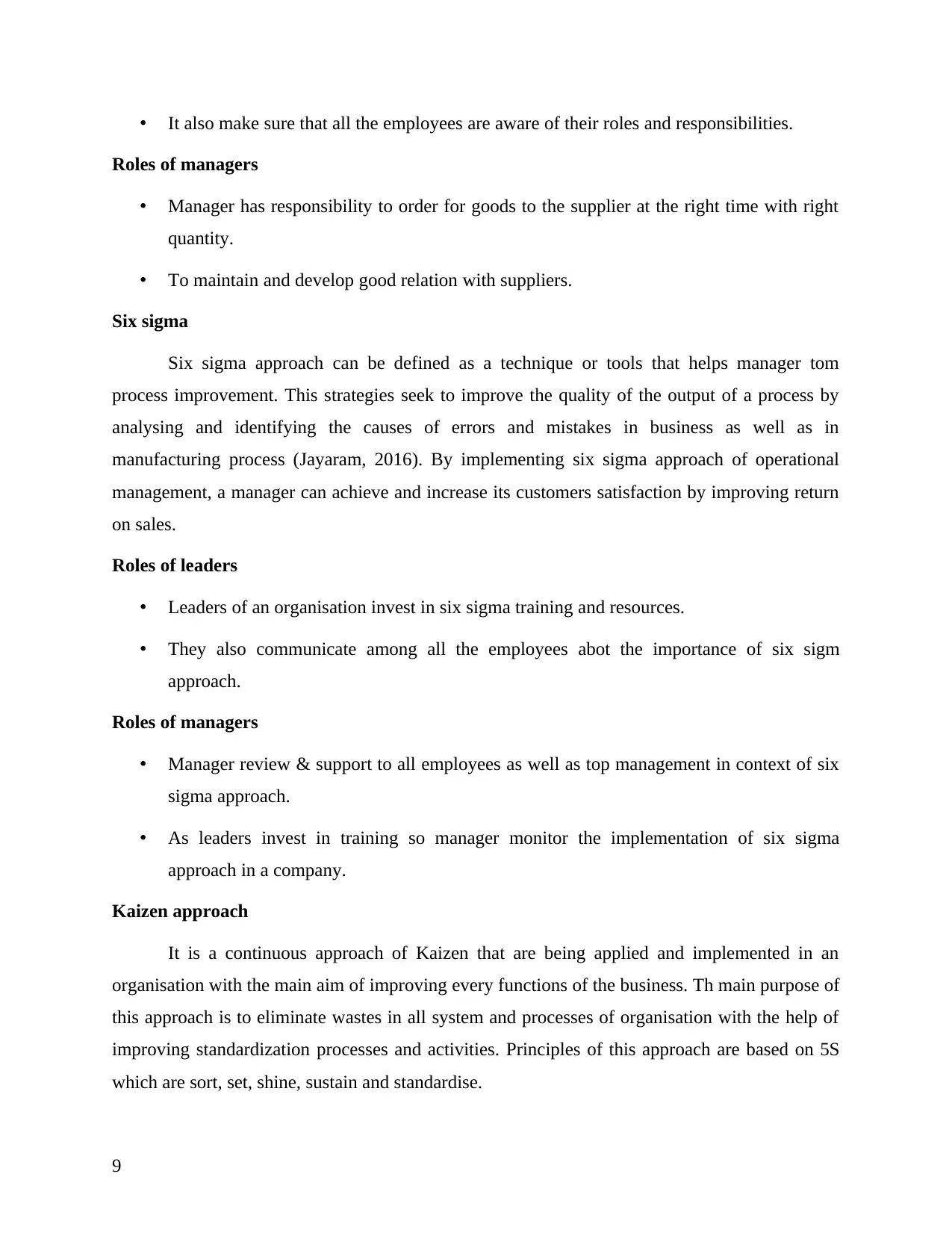
• It also make sure that all the employees are aware of their roles and responsibilities.
Roles of managers
• Manager has responsibility to order for goods to the supplier at the right time with right
quantity.
• To maintain and develop good relation with suppliers.
Six sigma
Six sigma approach can be defined as a technique or tools that helps manager tom
process improvement. This strategies seek to improve the quality of the output of a process by
analysing and identifying the causes of errors and mistakes in business as well as in
manufacturing process (Jayaram, 2016). By implementing six sigma approach of operational
management, a manager can achieve and increase its customers satisfaction by improving return
on sales.
Roles of leaders
• Leaders of an organisation invest in six sigma training and resources.
• They also communicate among all the employees abot the importance of six sigm
approach.
Roles of managers
• Manager review & support to all employees as well as top management in context of six
sigma approach.
• As leaders invest in training so manager monitor the implementation of six sigma
approach in a company.
Kaizen approach
It is a continuous approach of Kaizen that are being applied and implemented in an
organisation with the main aim of improving every functions of the business. Th main purpose of
this approach is to eliminate wastes in all system and processes of organisation with the help of
improving standardization processes and activities. Principles of this approach are based on 5S
which are sort, set, shine, sustain and standardise.
9
Roles of managers
• Manager has responsibility to order for goods to the supplier at the right time with right
quantity.
• To maintain and develop good relation with suppliers.
Six sigma
Six sigma approach can be defined as a technique or tools that helps manager tom
process improvement. This strategies seek to improve the quality of the output of a process by
analysing and identifying the causes of errors and mistakes in business as well as in
manufacturing process (Jayaram, 2016). By implementing six sigma approach of operational
management, a manager can achieve and increase its customers satisfaction by improving return
on sales.
Roles of leaders
• Leaders of an organisation invest in six sigma training and resources.
• They also communicate among all the employees abot the importance of six sigm
approach.
Roles of managers
• Manager review & support to all employees as well as top management in context of six
sigma approach.
• As leaders invest in training so manager monitor the implementation of six sigma
approach in a company.
Kaizen approach
It is a continuous approach of Kaizen that are being applied and implemented in an
organisation with the main aim of improving every functions of the business. Th main purpose of
this approach is to eliminate wastes in all system and processes of organisation with the help of
improving standardization processes and activities. Principles of this approach are based on 5S
which are sort, set, shine, sustain and standardise.
9
⊘ This is a preview!⊘
Do you want full access?
Subscribe today to unlock all pages.

Trusted by 1+ million students worldwide
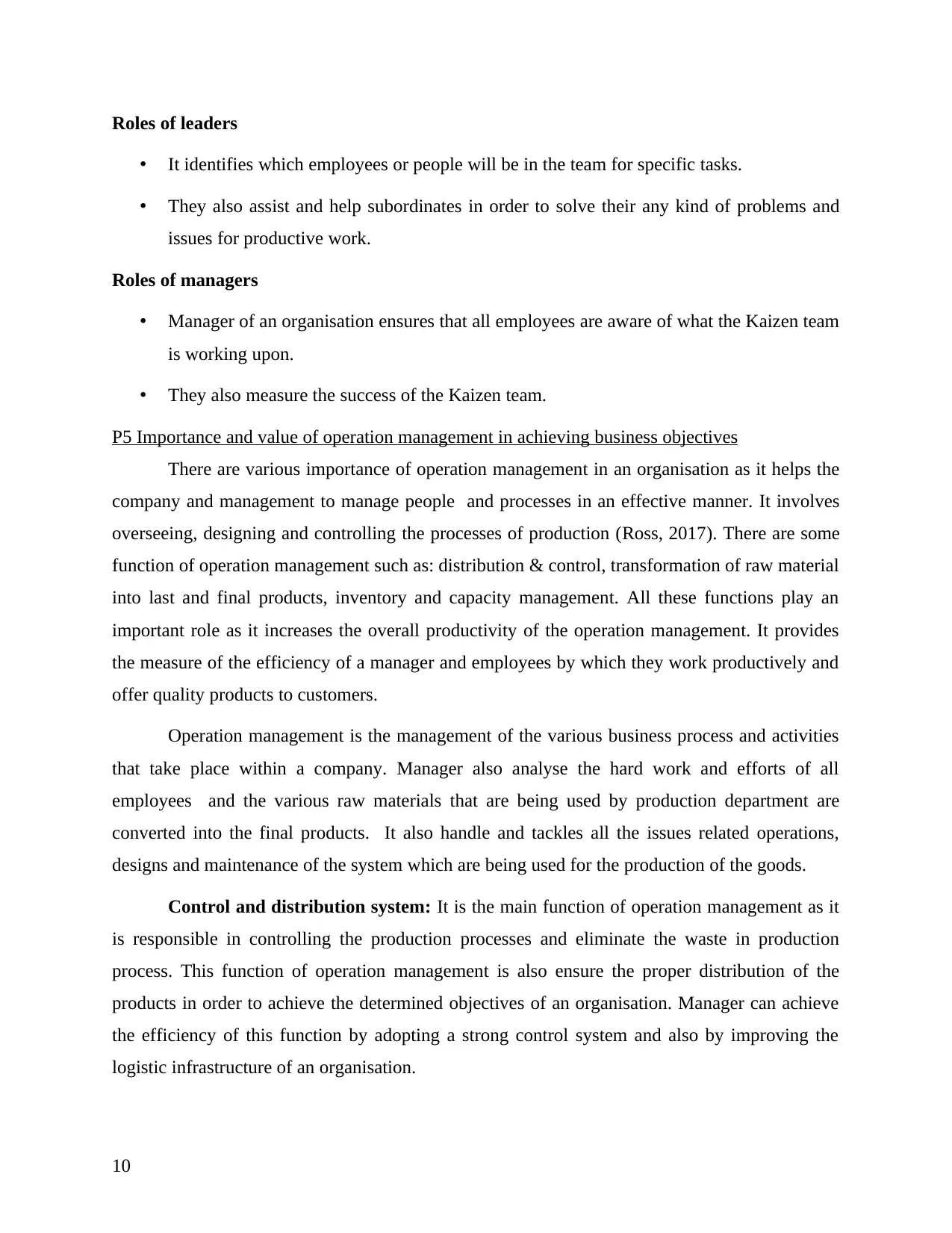
Roles of leaders
• It identifies which employees or people will be in the team for specific tasks.
• They also assist and help subordinates in order to solve their any kind of problems and
issues for productive work.
Roles of managers
• Manager of an organisation ensures that all employees are aware of what the Kaizen team
is working upon.
• They also measure the success of the Kaizen team.
P5 Importance and value of operation management in achieving business objectives
There are various importance of operation management in an organisation as it helps the
company and management to manage people and processes in an effective manner. It involves
overseeing, designing and controlling the processes of production (Ross, 2017). There are some
function of operation management such as: distribution & control, transformation of raw material
into last and final products, inventory and capacity management. All these functions play an
important role as it increases the overall productivity of the operation management. It provides
the measure of the efficiency of a manager and employees by which they work productively and
offer quality products to customers.
Operation management is the management of the various business process and activities
that take place within a company. Manager also analyse the hard work and efforts of all
employees and the various raw materials that are being used by production department are
converted into the final products. It also handle and tackles all the issues related operations,
designs and maintenance of the system which are being used for the production of the goods.
Control and distribution system: It is the main function of operation management as it
is responsible in controlling the production processes and eliminate the waste in production
process. This function of operation management is also ensure the proper distribution of the
products in order to achieve the determined objectives of an organisation. Manager can achieve
the efficiency of this function by adopting a strong control system and also by improving the
logistic infrastructure of an organisation.
10
• It identifies which employees or people will be in the team for specific tasks.
• They also assist and help subordinates in order to solve their any kind of problems and
issues for productive work.
Roles of managers
• Manager of an organisation ensures that all employees are aware of what the Kaizen team
is working upon.
• They also measure the success of the Kaizen team.
P5 Importance and value of operation management in achieving business objectives
There are various importance of operation management in an organisation as it helps the
company and management to manage people and processes in an effective manner. It involves
overseeing, designing and controlling the processes of production (Ross, 2017). There are some
function of operation management such as: distribution & control, transformation of raw material
into last and final products, inventory and capacity management. All these functions play an
important role as it increases the overall productivity of the operation management. It provides
the measure of the efficiency of a manager and employees by which they work productively and
offer quality products to customers.
Operation management is the management of the various business process and activities
that take place within a company. Manager also analyse the hard work and efforts of all
employees and the various raw materials that are being used by production department are
converted into the final products. It also handle and tackles all the issues related operations,
designs and maintenance of the system which are being used for the production of the goods.
Control and distribution system: It is the main function of operation management as it
is responsible in controlling the production processes and eliminate the waste in production
process. This function of operation management is also ensure the proper distribution of the
products in order to achieve the determined objectives of an organisation. Manager can achieve
the efficiency of this function by adopting a strong control system and also by improving the
logistic infrastructure of an organisation.
10
Paraphrase This Document
Need a fresh take? Get an instant paraphrase of this document with our AI Paraphraser
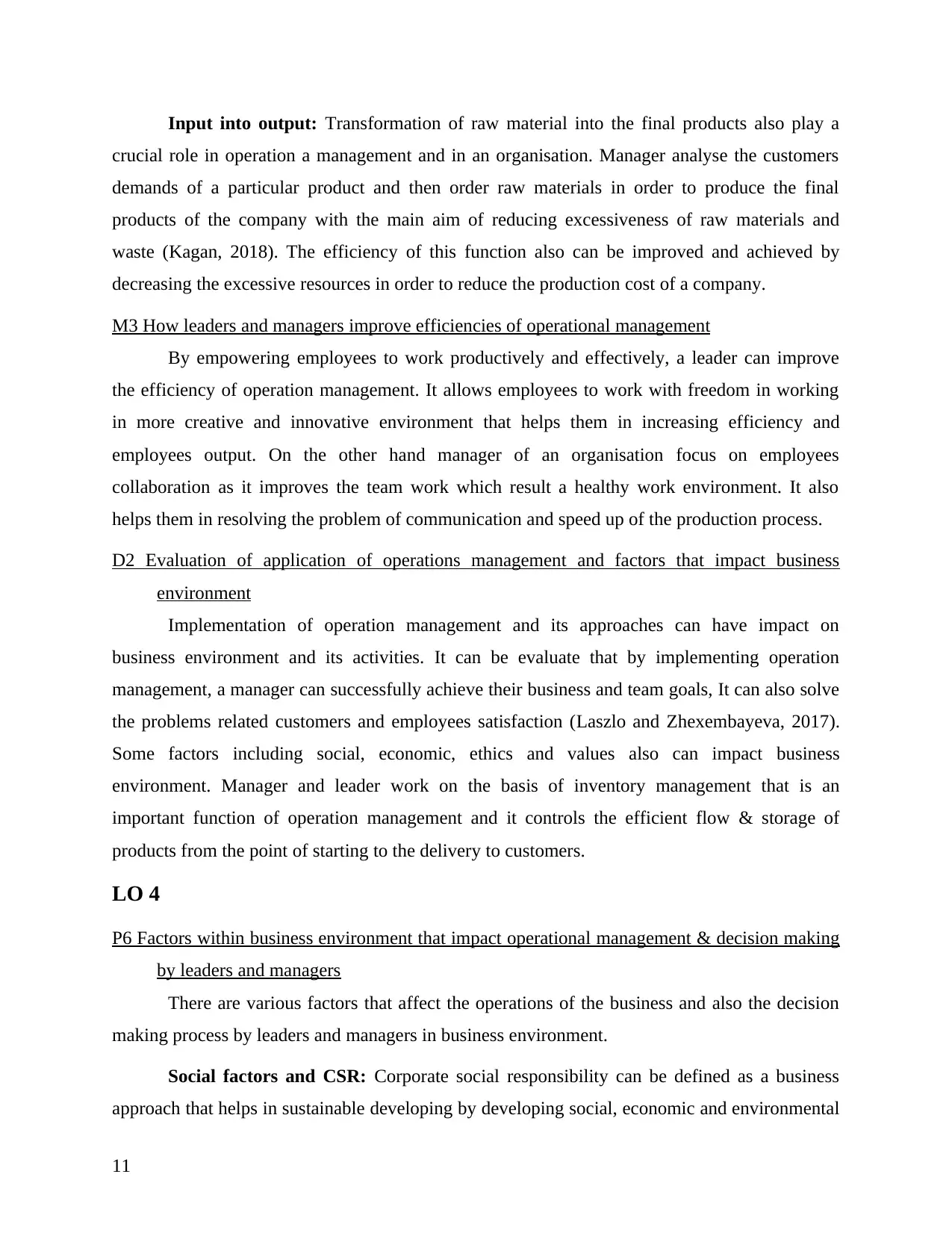
Input into output: Transformation of raw material into the final products also play a
crucial role in operation a management and in an organisation. Manager analyse the customers
demands of a particular product and then order raw materials in order to produce the final
products of the company with the main aim of reducing excessiveness of raw materials and
waste (Kagan, 2018). The efficiency of this function also can be improved and achieved by
decreasing the excessive resources in order to reduce the production cost of a company.
M3 How leaders and managers improve efficiencies of operational management
By empowering employees to work productively and effectively, a leader can improve
the efficiency of operation management. It allows employees to work with freedom in working
in more creative and innovative environment that helps them in increasing efficiency and
employees output. On the other hand manager of an organisation focus on employees
collaboration as it improves the team work which result a healthy work environment. It also
helps them in resolving the problem of communication and speed up of the production process.
D2 Evaluation of application of operations management and factors that impact business
environment
Implementation of operation management and its approaches can have impact on
business environment and its activities. It can be evaluate that by implementing operation
management, a manager can successfully achieve their business and team goals, It can also solve
the problems related customers and employees satisfaction (Laszlo and Zhexembayeva, 2017).
Some factors including social, economic, ethics and values also can impact business
environment. Manager and leader work on the basis of inventory management that is an
important function of operation management and it controls the efficient flow & storage of
products from the point of starting to the delivery to customers.
LO 4
P6 Factors within business environment that impact operational management & decision making
by leaders and managers
There are various factors that affect the operations of the business and also the decision
making process by leaders and managers in business environment.
Social factors and CSR: Corporate social responsibility can be defined as a business
approach that helps in sustainable developing by developing social, economic and environmental
11
crucial role in operation a management and in an organisation. Manager analyse the customers
demands of a particular product and then order raw materials in order to produce the final
products of the company with the main aim of reducing excessiveness of raw materials and
waste (Kagan, 2018). The efficiency of this function also can be improved and achieved by
decreasing the excessive resources in order to reduce the production cost of a company.
M3 How leaders and managers improve efficiencies of operational management
By empowering employees to work productively and effectively, a leader can improve
the efficiency of operation management. It allows employees to work with freedom in working
in more creative and innovative environment that helps them in increasing efficiency and
employees output. On the other hand manager of an organisation focus on employees
collaboration as it improves the team work which result a healthy work environment. It also
helps them in resolving the problem of communication and speed up of the production process.
D2 Evaluation of application of operations management and factors that impact business
environment
Implementation of operation management and its approaches can have impact on
business environment and its activities. It can be evaluate that by implementing operation
management, a manager can successfully achieve their business and team goals, It can also solve
the problems related customers and employees satisfaction (Laszlo and Zhexembayeva, 2017).
Some factors including social, economic, ethics and values also can impact business
environment. Manager and leader work on the basis of inventory management that is an
important function of operation management and it controls the efficient flow & storage of
products from the point of starting to the delivery to customers.
LO 4
P6 Factors within business environment that impact operational management & decision making
by leaders and managers
There are various factors that affect the operations of the business and also the decision
making process by leaders and managers in business environment.
Social factors and CSR: Corporate social responsibility can be defined as a business
approach that helps in sustainable developing by developing social, economic and environmental
11
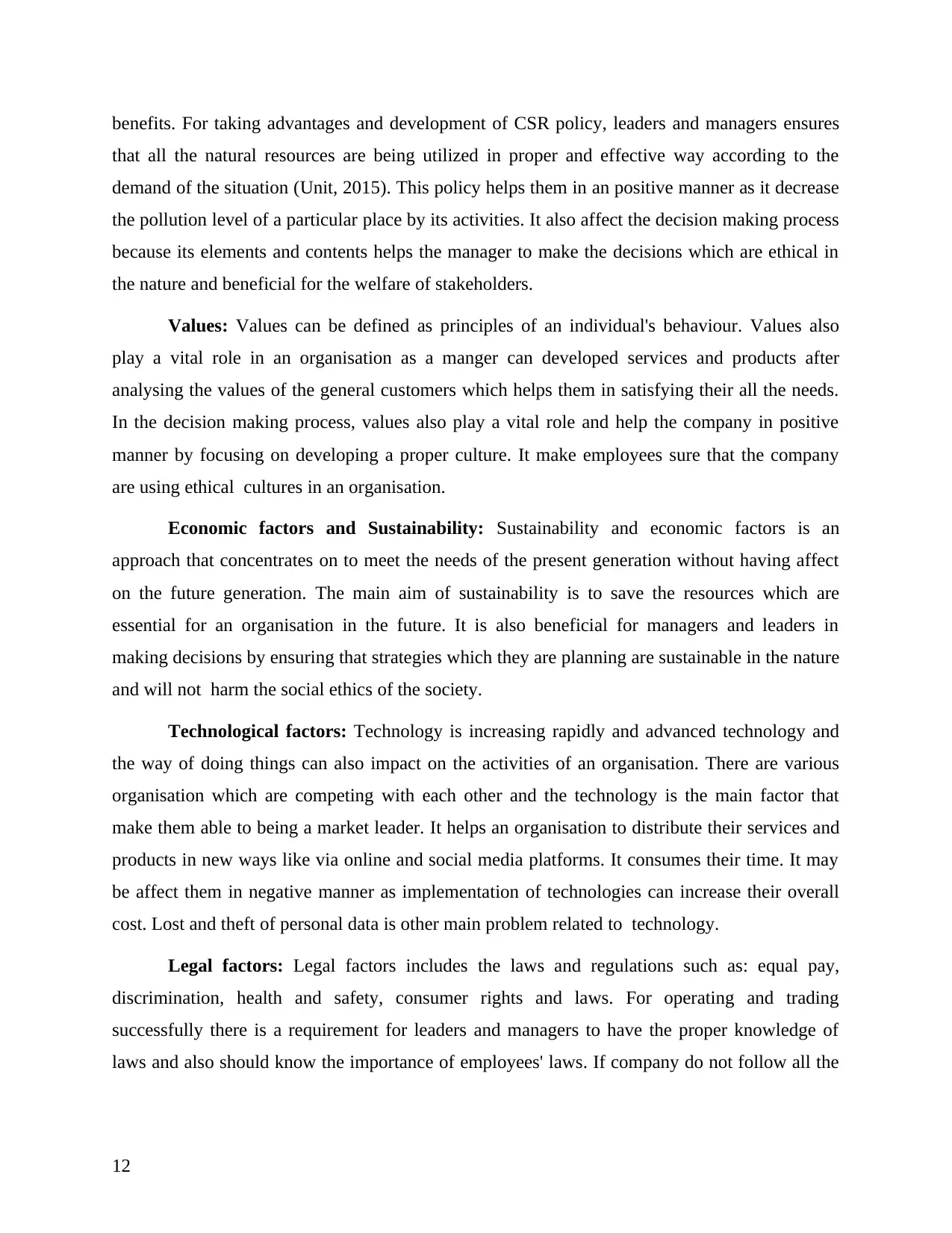
benefits. For taking advantages and development of CSR policy, leaders and managers ensures
that all the natural resources are being utilized in proper and effective way according to the
demand of the situation (Unit, 2015). This policy helps them in an positive manner as it decrease
the pollution level of a particular place by its activities. It also affect the decision making process
because its elements and contents helps the manager to make the decisions which are ethical in
the nature and beneficial for the welfare of stakeholders.
Values: Values can be defined as principles of an individual's behaviour. Values also
play a vital role in an organisation as a manger can developed services and products after
analysing the values of the general customers which helps them in satisfying their all the needs.
In the decision making process, values also play a vital role and help the company in positive
manner by focusing on developing a proper culture. It make employees sure that the company
are using ethical cultures in an organisation.
Economic factors and Sustainability: Sustainability and economic factors is an
approach that concentrates on to meet the needs of the present generation without having affect
on the future generation. The main aim of sustainability is to save the resources which are
essential for an organisation in the future. It is also beneficial for managers and leaders in
making decisions by ensuring that strategies which they are planning are sustainable in the nature
and will not harm the social ethics of the society.
Technological factors: Technology is increasing rapidly and advanced technology and
the way of doing things can also impact on the activities of an organisation. There are various
organisation which are competing with each other and the technology is the main factor that
make them able to being a market leader. It helps an organisation to distribute their services and
products in new ways like via online and social media platforms. It consumes their time. It may
be affect them in negative manner as implementation of technologies can increase their overall
cost. Lost and theft of personal data is other main problem related to technology.
Legal factors: Legal factors includes the laws and regulations such as: equal pay,
discrimination, health and safety, consumer rights and laws. For operating and trading
successfully there is a requirement for leaders and managers to have the proper knowledge of
laws and also should know the importance of employees' laws. If company do not follow all the
12
that all the natural resources are being utilized in proper and effective way according to the
demand of the situation (Unit, 2015). This policy helps them in an positive manner as it decrease
the pollution level of a particular place by its activities. It also affect the decision making process
because its elements and contents helps the manager to make the decisions which are ethical in
the nature and beneficial for the welfare of stakeholders.
Values: Values can be defined as principles of an individual's behaviour. Values also
play a vital role in an organisation as a manger can developed services and products after
analysing the values of the general customers which helps them in satisfying their all the needs.
In the decision making process, values also play a vital role and help the company in positive
manner by focusing on developing a proper culture. It make employees sure that the company
are using ethical cultures in an organisation.
Economic factors and Sustainability: Sustainability and economic factors is an
approach that concentrates on to meet the needs of the present generation without having affect
on the future generation. The main aim of sustainability is to save the resources which are
essential for an organisation in the future. It is also beneficial for managers and leaders in
making decisions by ensuring that strategies which they are planning are sustainable in the nature
and will not harm the social ethics of the society.
Technological factors: Technology is increasing rapidly and advanced technology and
the way of doing things can also impact on the activities of an organisation. There are various
organisation which are competing with each other and the technology is the main factor that
make them able to being a market leader. It helps an organisation to distribute their services and
products in new ways like via online and social media platforms. It consumes their time. It may
be affect them in negative manner as implementation of technologies can increase their overall
cost. Lost and theft of personal data is other main problem related to technology.
Legal factors: Legal factors includes the laws and regulations such as: equal pay,
discrimination, health and safety, consumer rights and laws. For operating and trading
successfully there is a requirement for leaders and managers to have the proper knowledge of
laws and also should know the importance of employees' laws. If company do not follow all the
12
⊘ This is a preview!⊘
Do you want full access?
Subscribe today to unlock all pages.

Trusted by 1+ million students worldwide
1 out of 14
Related Documents
Your All-in-One AI-Powered Toolkit for Academic Success.
+13062052269
info@desklib.com
Available 24*7 on WhatsApp / Email
![[object Object]](/_next/static/media/star-bottom.7253800d.svg)
Unlock your academic potential
Copyright © 2020–2026 A2Z Services. All Rights Reserved. Developed and managed by ZUCOL.





